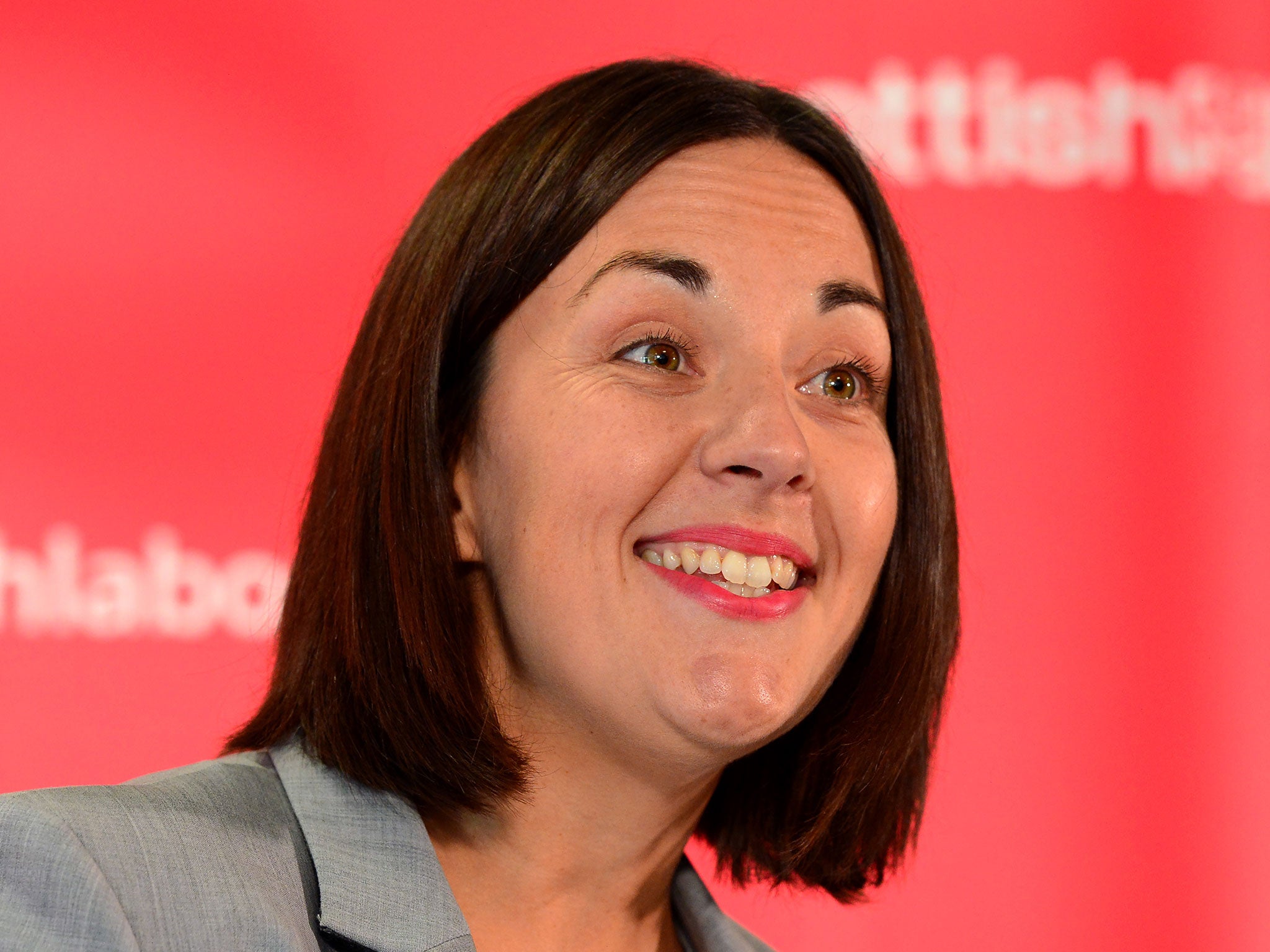Kezia Dugdale: Scottish Labour's new leader, 33, claims optimism of youth
Party is down but not out, says new leader, after winning an outright victory

The future of Labour in Scotland is in the hands of a "new generation without the baggage of the past", Kezia Dugdale said after she was elected party leader at the age of 33.
After the near wipeout of Scotland’s Labour MPs in May and with polls predicting a follow-up landslide for the SNP in next year’s Scottish Parliament elections, Ms Dugdale, who has only been in the Holyrood parliament for only four years, has arguably inherited one of the toughest jobs in British politics.
Following the result of the leadership contest, where Ms Dugdale, who easily defeating the experienced MSP Ken Mackintosh by winning 72 per cent of the vote, Ms Dugdale set a low bar for her immediate objectives. She declared she was not yet asking for votes, but only “the chance to be heard and for Scotland to take another look at Labour under my leadership”.
She said: “We are changing. I am part of a new generation. Someone without the baggage of the past,” she added.”
Alex Rowley, the a former general secretary of the Scottish Labour Party and a former aide to Gordon Brown, was elected Ms Dugdale’s new deputy.
The result of the contest, which in its final stages was overshadowed by the unexpected rise of Jeremy Corbyn as potentially Labour’s potential next leader, was welcomed by Harriet Harman.
Labour’s interim leader offered the pair her congratulations, promising full support from “the whole of the party”. She said: “They will be leading the historic task of rebuilding our party in Scotland, reconnecting with the people of Scotland and re-energising the links between our party in Scotland, Wales and England.”
Asked on Sky News if she would work with Mr Corbyn should he win, Ms Dugdale said she would be “delighted to work with any of the four in the leadership contest”.
After the result was announced in Stirling, she attempted to improve her party’s morale by insisting that the scale of her victory meant a clear mandate to change Labour north of the border.
Acknowledging that the period since the general election had been “incredibly difficult” across the country and that a “large part of the population have simply switched off from us”, she said: “We are down, but we are not out.”
Hinting that it had been a mistake for Scottish Labour to side with the Conservatives during last year’s independence referendum, Ms Dugdale promised more policy autonomy from London, a “big education crusade”, a commitment to “get the health service working again” and for Labour to be “on the side of working people”.
Her rapid rise and the lack of a high-profile opponent in the leadership contest is a reflection of Labour’s woes. It is barely six eight months since she became deputy, at the same time that as Jim Murphy was elected leader. Mr Murphy, along with and Douglas Alexander were the two highest-profile Labour casualties in the SNP’s Scottish landslide three months ago.
Before being elected to Holyrood, Ms Dugdale worked for four years as the office manager and adviser to Lord Foulkes when he was also an MSP. In the 2013 Scottish Politician of the Year awards, she won the “one to watch” category, a decision that now appears fully justified.
The SNP offered tentative congratulations. with the nationalists’ Its business convenor, Derek Mackay, saying said that he looked forward to working with both Ms Dugdale and Mr Rowley. However, he added: “This is a chance for Labour to show it has learned and to prove it is capable of making a break from an endless and obsessively anti-SNP agenda.”Around 21,000 party and union affiliated members were eligible to take part in the ballot.
Six leaders in 15 years
Donald Dewar
(May 1999 to Oct 2000)
Scotland’s inaugural First Minister. Driving force behind devolution. Highest ministerial profile in Westminster among recent Scottish leaders. Led a Labour-Liberal Democrat coalition. Died of a brain haemorrhage while still in office.
Henry McLeish
(Oct 2000 to Nov 2001)
Former cCouncillor, became MP in 1987. Minister of State in early Blair years. Close to Dewar. Resigned during financial scandal involving the letting of his state-subsidised constituency office.
Jack McConnell
(Nov 2001 to Aug 2007)
Former general secretary, Scottish Labour Party. Former finance and minister and in the first Dewar administration. Eeducation minister under McLeish. First Minister for six years. Resigned after defeat, by one seat, to Alex Salmond’s SNP.
Wendy Alexander
(Sept 2007 to June 2008)
Dewar’s former adviser. Sister of Douglas Alexander, former Labour cabinet minister. MSP from 1999-2011. Elected after McConnell with promise to “renew the party’s organisation”. Resigned after controversy over £950 questionable £950 donation of £950 from a a property boss.
Iain Gray
(Sept 2008 to Dec 2011)
Initially deputy leader. Defeated in 2003 Holyrood elections. Became adviser to Alistair Darling. Returned to Holyrood in 2007. Led Labour group after Alexander’s resignation. Resigned after the 2011 SNP landslide.
Johann Lamont
(Dec 2011 to Oct 2014)
MSP from 1999. Led Scottish Labour for three years till she resigned unexpectedly in 2014, criticising Ed Miliband for treating the Scottish party “like a branch office”.
Jim Murphy
(Dec 2014 to Jun 2015)
Former cabinet minister. MP, from 2005 to 2015. Elected Scottish leader in 2014. Promised to revive the Scottish party. Lost his seat in 2015 general election, resigned soon after.
Join our commenting forum
Join thought-provoking conversations, follow other Independent readers and see their replies
Comments
Bookmark popover
Removed from bookmarks